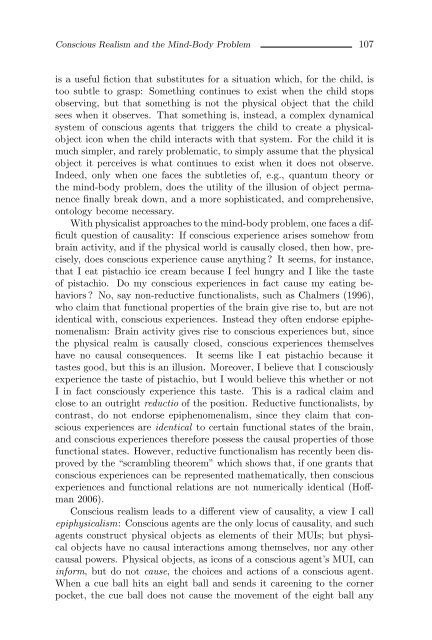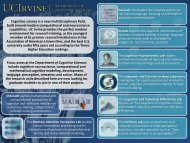Conscious Realism and the Mind-Body Problem - UCI Cognitive ...
Conscious Realism and the Mind-Body Problem - UCI Cognitive ...
Conscious Realism and the Mind-Body Problem - UCI Cognitive ...
You also want an ePaper? Increase the reach of your titles
YUMPU automatically turns print PDFs into web optimized ePapers that Google loves.
<strong>Conscious</strong> <strong>Realism</strong> <strong>and</strong> <strong>the</strong> <strong>Mind</strong>-<strong>Body</strong> <strong>Problem</strong> 107is a useful fiction that substitutes for a situation which, for <strong>the</strong> child, istoo subtle to grasp: Something continues to exist when <strong>the</strong> child stopsobserving, but that something is not <strong>the</strong> physical object that <strong>the</strong> childsees when it observes. That something is, instead, a complex dynamicalsystem of conscious agents that triggers <strong>the</strong> child to create a physicalobjecticon when <strong>the</strong> child interacts with that system. For <strong>the</strong> child it ismuch simpler, <strong>and</strong> rarely problematic, to simply assume that <strong>the</strong> physicalobject it perceives is what continues to exist when it does not observe.Indeed, only when one faces <strong>the</strong> subtleties of, e.g., quantum <strong>the</strong>ory or<strong>the</strong> mind-body problem, does <strong>the</strong> utility of <strong>the</strong> illusion of object permanencefinally break down, <strong>and</strong> a more sophisticated, <strong>and</strong> comprehensive,ontology become necessary.With physicalist approaches to <strong>the</strong> mind-body problem, one faces a difficultquestion of causality: If conscious experience arises somehow frombrain activity, <strong>and</strong> if <strong>the</strong> physical world is causally closed, <strong>the</strong>n how, precisely,does conscious experience cause anything ? It seems, for instance,that I eat pistachio ice cream because I feel hungry <strong>and</strong> I like <strong>the</strong> tasteof pistachio. Do my conscious experiences in fact cause my eating behaviors? No, say non-reductive functionalists, such as Chalmers (1996),who claim that functional properties of <strong>the</strong> brain give rise to, but are notidentical with, conscious experiences. Instead <strong>the</strong>y often endorse epiphenomenalism:Brain activity gives rise to conscious experiences but, since<strong>the</strong> physical realm is causally closed, conscious experiences <strong>the</strong>mselveshave no causal consequences. It seems like I eat pistachio because ittastes good, but this is an illusion. Moreover, I believe that I consciouslyexperience <strong>the</strong> taste of pistachio, but I would believe this whe<strong>the</strong>r or notI in fact consciously experience this taste. This is a radical claim <strong>and</strong>close to an outright reductio of <strong>the</strong> position. Reductive functionalists, bycontrast, do not endorse epiphenomenalism, since <strong>the</strong>y claim that consciousexperiences are identical to certain functional states of <strong>the</strong> brain,<strong>and</strong> conscious experiences <strong>the</strong>refore possess <strong>the</strong> causal properties of thosefunctional states. However, reductive functionalism has recently been disprovedby <strong>the</strong> “scrambling <strong>the</strong>orem” which shows that, if one grants thatconscious experiences can be represented ma<strong>the</strong>matically, <strong>the</strong>n consciousexperiences <strong>and</strong> functional relations are not numerically identical (Hoffman2006).<strong>Conscious</strong> realism leads to a different view of causality, a view I callepiphysicalism: <strong>Conscious</strong> agents are <strong>the</strong> only locus of causality, <strong>and</strong> suchagents construct physical objects as elements of <strong>the</strong>ir MUIs; but physicalobjects have no causal interactions among <strong>the</strong>mselves, nor any o<strong>the</strong>rcausal powers. Physical objects, as icons of a conscious agent’s MUI, caninform, but do not cause, <strong>the</strong> choices <strong>and</strong> actions of a conscious agent.When a cue ball hits an eight ball <strong>and</strong> sends it careening to <strong>the</strong> cornerpocket, <strong>the</strong> cue ball does not cause <strong>the</strong> movement of <strong>the</strong> eight ball any







